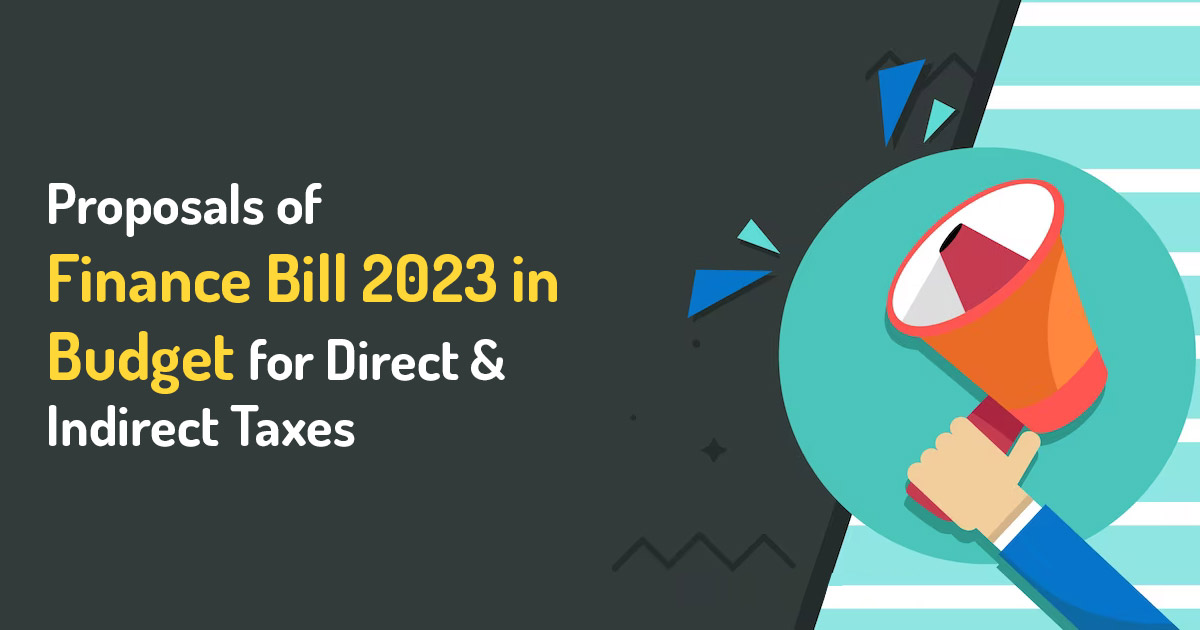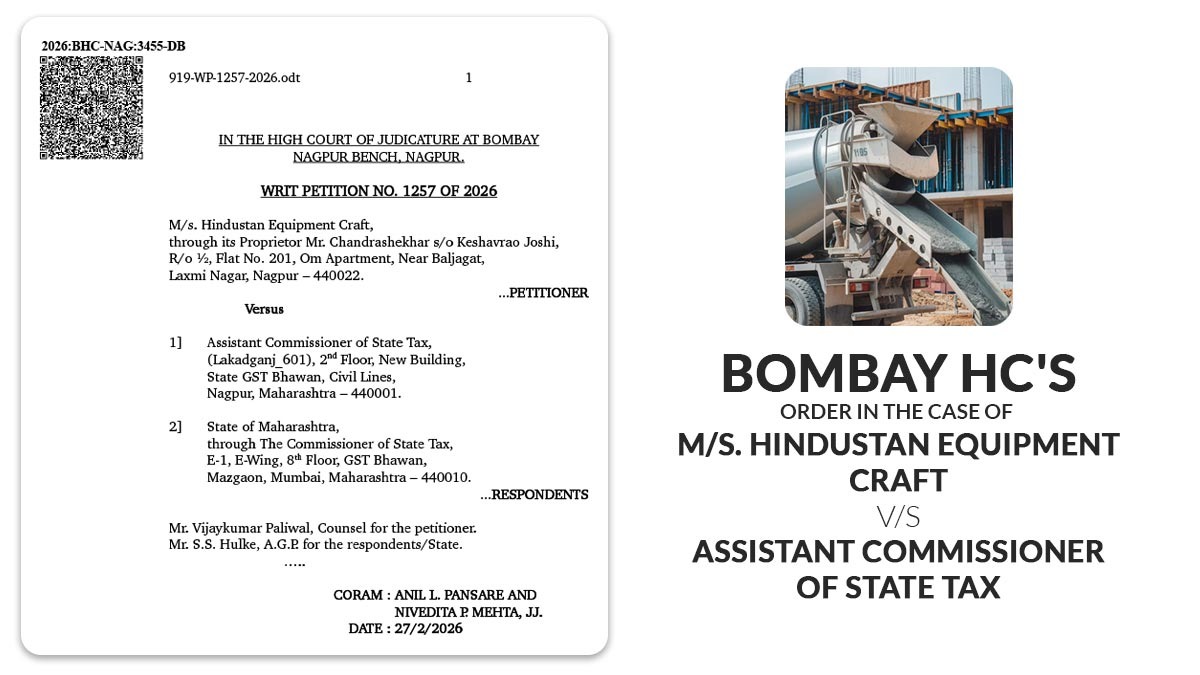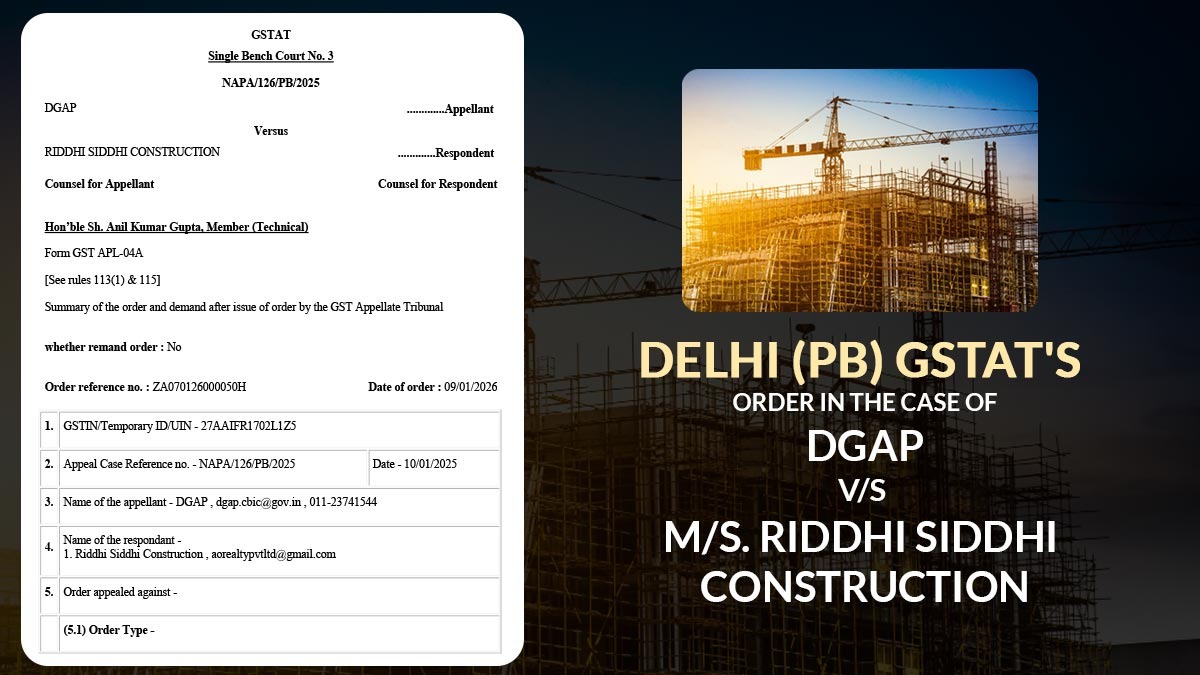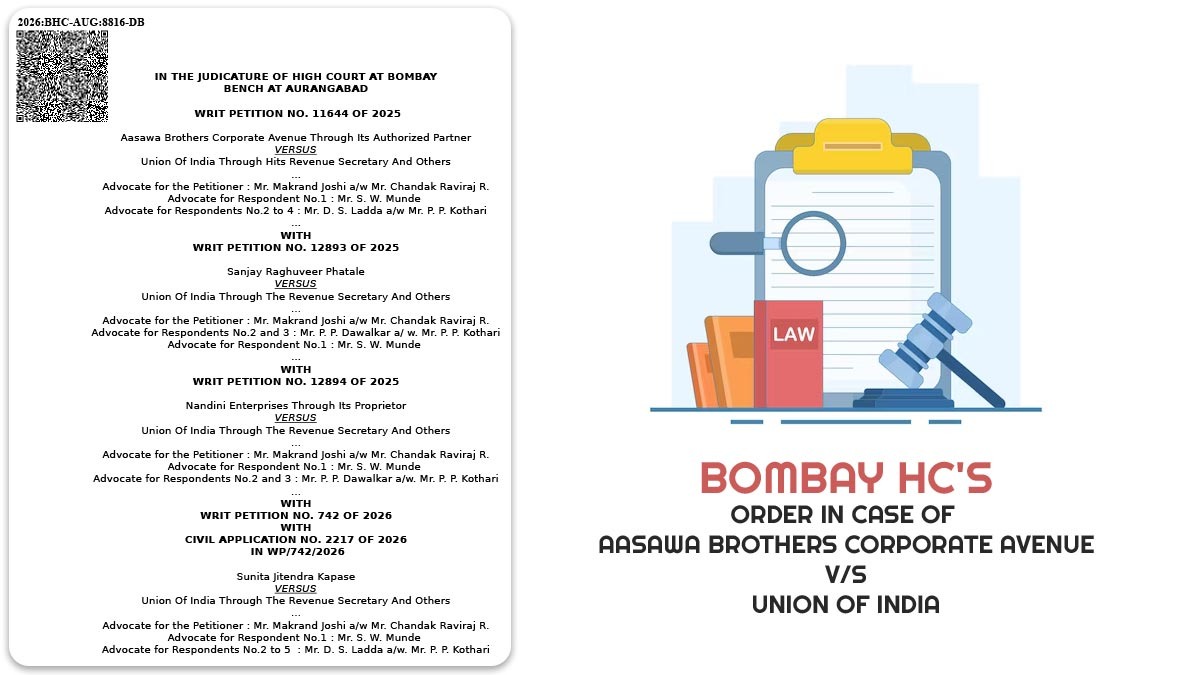
Overview of the Direct and Indirect Tax Proposals in Budget 2023 (Finance Bill 2023) presented by Smt. Nirmala Sitharaman, Union Minister of Finance and Corporate Affairs.
Key Highlights of Finance Bill 2023 for Direct Tax
In Budget 2023, the Finance Minister announced a number of changes to personal income tax, including a rise in the tax rebate limit, an increase in the income bracket for tax exemption, an increase in the tax-exempt leave encashment limit, and more. Additionally, the standard deduction advantage has been extended to taxpayers who are employed or receiving a pension, and the maximum surcharge rate has been lowered under the new tax regime.
The direct tax recommendations in the Budget for 2023 are intended to ensure continuity and stability in taxes, simplify and rationalize numerous rules to lessen the cost of compliance, encourage the entrepreneurial spirit, and give residents tax relief. By making compliance simple and straightforward, the Income Tax Department will continue to enhance taxpayer services. The Finance Bill 2023’s direct tax measures are outlined as follows:
New Common Income Tax Return Form
For the ease and benefit of taxpayers, the Finance Minister suggested implementing a new Common ITR Form in Budget 2023.
Fixes the Issues by Maintaining a Mechanism
The Finance Minister suggested strengthening the direct tax grievance redressal system in Budget 2023. The Finance Minister stated that she will assign around 100 Joint Commissioners to deal with minor direct tax appeals while presenting the Budget 2023. She said that the agency will take cases for the evaluation of returns submitted this year with more attention.
Increase the Limit of Tax Rebate to Rs. 7 lac U/S 87A
The Finance Minister suggested in Budget 2023 increasing the threshold for Tax Rebates under Section 87A in the new tax regime from Rs. 5 lac to Rs. 7 lac. Individuals earning up to Rs. 7 lac are therefore free from paying tax under the new tax system.
Tax Exemption Threshold to Rs. 3 lakhs
The Finance Minister suggested increasing the tax exemption threshold (slab) under the new tax regime to Rs. 3 lac in Budget 2023. Six income slabs make up the new regime’s personal income tax structure, which would be reduced to five with the increase in the tax exemption threshold to Rs. 3 lac. All taxpayers under the new regime will get considerable relief as a result of this improvement.
New Income Tax Slab Rates in Finance Bill 2023
| Total Revenue in Rupees | Rate |
|---|---|
| Up to 3,00,000 | NIL |
| From 3,00,001 to 6,00,000 | 5% |
| From 6,00,001 to 9,00,000 | 10% |
| From 9,00,001 to 12,00,000 | 15% |
| From 12,00,001 to 15,00,000 | 20% |
| Above 15,00,000 | 30% |
Extends the Benefits of Standard Deduction Under the NTR
The Finance Minister recommended in Budget 2023 that salaried people also be eligible for the basic deduction of Rs. 50,000 and the deduction from family pensions of up to Rs. 15,000 for assessees under the new tax regime.
Highest Tax Rate Decreasing From 37% to 25% in Budget 2023-24
In Budget 2023, the Finance Minister suggested lowering the highest surcharge rate under the new tax system from 37% to 25%, which would lower the top marginal rate (personal income tax rate) from 42% to 39%.
Increased Exemption for Leave Encashment in Union Budget 2023
The Finance Minister recommended increasing the threshold for non-government paid employees’ tax exemption on leave encashment after retirement to Rs. 25 lacks in Budget 2023.
Default Tax Regime to be Changed to NTR
The 2020 income tax regime would be adopted as the default tax regime, according to the Finance Minister. Taxpayers will, however, have the choice to continue enjoying the advantages of the prior tax regime.
Increase Limits for MSMEs and Professionals Under Presumptive Taxation
Increased presumptive taxes limitations are proposed in Budget 2023 for some professions and micro, small, and medium-sized businesses (MSMEs). Only if the quantity or total amount received in cash throughout the year does not exceed 5% of total gross receipts or turnover will the enhanced limit be applicable. The budget proposes greater restrictions for microenterprises and specific specialists to benefit from presumed taxes and refers to MSMEs as the development engines of our economy.
Deductions Only After MSMEs Have Received Actual Payments
Budget 2023 suggests only deducting costs associated with payments made to MSMEs when those payments are actually made to them in order to help MSMEs get payments on time. In other words, only when a payment is made to help MSMEs receive payments on schedule will it be eligible for a deduction for expenses related to payments made to MSMEs.
Relaxation to Cooperative Sector in Budget 2023
In Budget 2023, the Finance Minister presented a number of recommendations regarding the cooperative industry, including the following:
- i New cooperatives will be eligible for a 15% tax rate, which is presently offered to new manufacturing enterprises, if they start manufacturing operations before March 31, 2024.
- ii) Permitting sugar cooperatives to deduct as expenses payments received to sugarcane growers before the assessment year 2016–17. They should receive close to Rs. 10,000 crores in relief as a result of this.
- iii) A greater cash deposit and lending limit of Rs. 2 lacks per member from primary agricultural cooperative societies (PACS) and primary cooperative agriculture and rural development banks (PCARDBs).
- iv) Co-operative societies would be given a greater maximum for TDS on cash withdrawals of Rs. 3 crores.
More Support for Start-ups in Budget 2023-24
The Finance Minister included many recommendations for “startups” in Budget 2023, including the following:
- i) The date of incorporation for start-ups seeking income tax incentives will be moved from March 31, 2023, to March 31, 2024.
- ii) Increase the advantage of carrying forward losses on shareholding changes in new businesses from seven to 10 years following incorporation.
Tax Deduction U/S 54 & 54F at Rs 10 Crore
To better focus tax concessions and exemptions, the Finance Minister recommended reducing the deduction from capital gains on residential housing investments under Sections 54 and 54F at Rs. 10 crores in Budget 2023.
Insurance Policies with Aggregate Premiums Exceeding Rs. 5 lac are Not Exempted
The aggregate premium for life insurance policies (other than ULIPs) issued on or after April 1, 2023, must be more than Rs. 5 lacks in order to qualify for the income tax exemption from proceeds of very high-value insurance policies, according to a proposal made by the Finance Minister in Budget 2023. Only income from insurance policies with total premiums up to Rs. 5 lacks would thus be exempt.
Tax Exemption for Boards, Commissions and Income of Authorities in Budget 2023
The income of Authorities, Boards, and Commissions created by Union or State legislation for the purpose of housing, the development of cities, towns, and villages, and the regulation of activity or concern is proposed to be exempted by the Finance Minister in Budget 2023.
Remove the Minimum Threshold for TDS of Rs. 10,000
The removal of the TDS minimum threshold of Rs. 10,000 has been recommended by Finance Minister in Budget 2023.
EEE Status for Agniveer Fund
The Agniveer Fund should be given “EEE” status, according to the Finance Minister’s suggestion. It has also been suggested that the Agniveer Corpus Fund contribution received by Agniveers registered in the Agnipath Scheme, 2022, be free from income tax. In addition, it is intended to let Agniveer members deduct from their gross income any contributions made by taxpayers or the Central Government to their Seva Nidhi accounts.
TDS Rate for EPF Withdrawal in Non-PAN Cases is Now 20%
The TDS rate on the taxable share of EPF withdrawals in non-PAN cases has been suggested to be reduced from 30% to 20% by the Finance Minister.
Additional Direct Tax Proposals for the Finance Bill 2023
- i. There is no capital gain when exchanging electronic gold receipts for gold or electronic gold receipts for gold;
- ii) Taxation of income from market-linked debentures;
- iii) The tax-free term for money migrating to GIFT City in the IFSC has been extended till March 31, 2025.
- iv) Beginning April 1, 2023, some acts of omission committed by liquidators under Section 276A of the Income Tax Act shall be decriminalized.
- v) Strategic disinvestment losses, including IDBI Bank, shall be carried forward.
Read Also: Budget 2023: Know the Old & Latest Income Tax Slab Rates
Key Points of Finance Bill 2023 for Indirect Tax
In her announcement of indirect tax plans for the Budget 2023, Union Finance and Corporate Affairs Minister Smt. Nirmala Sitharaman emphasized the need for tax structure simplification with lower tax rates to ease the burden of compliance and enhance tax administration:
- i) Except for textiles and agriculture, the number of basic customs tax rates on goods has decreased from 21 to 13.
- ii) Toys, bicycles, autos, and naphtha have had their basic customs taxes, cesses, and surcharges somewhat adjusted.
- iii) In order to minimize tax cascading on blended compressed natural gas, the excise charge on GST-paid compressed biogas included within it has been eliminated.
- iv) Until March 31, 2024, certain capital goods and machinery imports necessary for the production of lithium-ion cells used in the batteries of electrically powered vehicles (EVs) are free from customs duties.
- v) It is proposed to exempt from customs duty, under certain conditions, vehicles, certain auto parts and components, subsystems, and tyres when they are imported for certification and/or testing by notified testing agencies.
- vi) The Finance Minister announced a reduction in customs tax on specific parts and inputs, such as camera lenses, in order to enhance local value addition in the production of mobile phones. The decreased tariff on lithium-ion cells used in batteries has been prolonged for a further year, while customs charges on camera lenses and the components used to create camera modules for cell phones have been slashed to nil.
- vii) The general customs tax on components of TV panel open cells has been decreased to 2.5 per cent.
- viii) In order to remedy the duty structure’s inversion and promote the manufacturing of electrical kitchen chimneys, the budget also suggests modifying the basic customs charge. Electric kitchen chimneys now have a 15% basic customs charge instead of the previous 7.5%.
- Heat coils used to create electric kitchen chimneys now have a basic customs charge of 15% rather than 20%.
- x) The chemical sector will be able to utilize denatured ethyl alcohol duty-free.
- xi) The basic customs tax on acid-grade fluorspar, which has a calcium fluoride content of more than 97% by weight, has been decreased from 5% to 2.5%.
- xii) According to a suggestion, the basic customs tax on the crude glycerin used to create Epichlorohydrin would decrease from 7.5% to 2.5%.
- xiii) Duty decrease on essential components used in the production of domestic shrimp feed
- xiv) The fundamental customs tax on seeds used to create diamonds in a laboratory has been reduced.
- xv) Import taxes on silver goods, such as jewellery, bars, and items, have been increased to correspond with those on gold and platinum.
- xvi) The basic exemption from customs duties on the raw materials required to make CRGO steel, ferrous scrap, and nickel cathode was preserved.
- xvii) The copper scrap BCD of 2.5 per cent is kept in place.
- xviii) Compound rubber’s basic customs tax rate was increased from 10% to 25%, or Rs. 30 per kilogramme, whichever is lower.
- xix) The National Calamity Contingent Duty (NCCD) was increased by around 16% on select cigarettes.
Legislative Changes Regarding Customs
- a) The Customs Act of 1962 should be changed so that the Settlement Commission has nine months from the date of the application to make a final ruling.
- b) Changing the Customs Tariff Act to make it clearer what anti-dumping duty (ADD), countervailing duty (CVD), and safeguard measures are intended to do and what they cover.
CGST Act Will be Modified
The CGST Act would be modified in accordance with the budget for 2023 such that:
- a) Raise from one crore to two crores the minimum tax threshold for starting a GST prosecution, with the exception of the offence of issuing bills without providing goods and services or both;
- b) decrease the amount of compounding from 50% to 150% of the tax amount to 25% to 100% of the tax amount;
- c) Decriminalize specific CGST offences or provisions, such as hindering an officer’s performance of their responsibilities, purposefully tampering with evidence, or neglecting to provide information.
- d) You only have three years from the date they were due to file returns and statements;
- e) Permit unregistered vendors and composition taxpayers to use e-commerce operators to transact business within the same state (ECOs).









